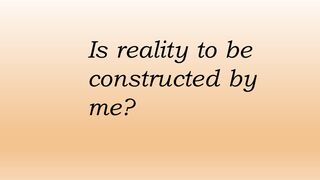Forgiveness
What Is Reality for You? 4 Considerations
So often, people develop a view of reality based on current popular opinion.
Posted July 28, 2022 Reviewed by Michelle Quirk
Key points
- Philosophy challenges us by asking: What is real, and how do we understand reality?
- Four different views of reality are described, from Ancient Greece to the present, along with some objections for each one.
- Consider which of the four views you favor and what this tells you about who you are as a person and what humanity is.
The philosophical area of metaphysics asks the question: What is the nature of reality? Is there an objective world out there, and can the mind grasp that?
To assist you, the reader, in determining your own view of what is real, I will present four views, from ancient Greece to the present. The order does not suggest that a given view was absent in another era, just less emphasized. As you examine each, try to see which is yours and what the strengths and weaknesses are of your position.
4 Views of Reality for You

Metaphysical position 1: Aristotelian realism. This philosophy states that there is an objective reality to the world and our task is to use our rationality to find out about this and then to accept it. As an example of my own field of the psychology of forgiveness, there is an objective, absolute, and universal definition of forgiveness that is not changed by time or culture. Yes, cultures can express forgiveness in different ways (called accidents in Aristotle's language—that does not mean mistakes; it means variations). The essence of forgiveness points to certain particular goals for forgiveness, such as to offer repair to a relationship, to emotionally heal, and to offer goodness as a goal in and of itself. The ancient Greeks took this objectivity very seriously with Plato, for example, in his book, The Republic, arguing that the best way to live is to embrace and foster the moral virtue of justice, for each person, and each community, anywhere in the world. In fact, even the title of this essay would seem odd as there is not one reality for you and then another for anyone else.
Metaphysical position 2: Immanuel Kant. This philosophy, from the late 18th century, deconstructs Aristotle's view that we all must adhere to an objective reality because the mind is not precise enough to grasp that reality. Therefore, we construct our own understanding of reality. Yes, we may all come to the same conclusion, and so there may be an objective truth toward which we are drawn, but our inner world, our cognitions, are the central basis of our forming a sense of what is real.

Metaphysical position 3: Piaget and Kohlberg as psychological constructivists. Kohlberg, up to 1987, who studied justice issues, claimed to be a Kantian. In other words, we construct our own reality about morals by thinking about them. As we think more complexly about morals, by taking in more people in a given moral dilemma, the better will be our conclusion. This idea became controversial because both Piaget and Kohlberg postulated stages of development, and so we all have an endpoint (a teleology) to which we all move. For Kohlberg, we are most highly developed in our morals when we adopt the Kantian "categorial imperative," which is a kind of test of our own generated moral laws. The test is this: If I, by my own reasoning, conclude that it is bad to lie, then can I impose that law on all people and say, "Thus, no one should ever lie"? If I can defend that statement, then I can adopt that as my moral law. You may come up with a different set of moral principles than I, but you would have to do so by the Kantian categorical imperative.
Metaphysical position 4: Subjectivism, including thoughts and feelings, is a predominant view in current Western societies. Rather than following an objective standard, such as, "I must strive for justice" as Plato argued, or following a cognitive test in the categorical imperative, as Kant and Kohlberg argued, subjectivism emphasizes freedom (freedom from the views of others). The standard for how to live resides within the person, within the realm of feelings and thoughts about what is good, what is desirable, and what is pleasurable. There are no external standards that are true, but only accepted by consensus, by societal norms, or traditions that can be altered at will.
Changes Across History
As you can probably see, there is a definite pattern across time in these four views of reality as follows:
We started with a fixed view of what is real in the external world, and our job as persons is to grasp what that is, grow as persons, and then do our best to live out that reality. The shift then was from an emphasis on the outer world to the inner world, as we construct our own views of reality, and, yet, the idea of the objectively real was not overthrown. The next move was to put more psychological heft into the inner cognitive world of us all by showing that the more complexly we can use our reasoning abilities, the closer we will come to understanding reality, but we still are all constructivists, in which thinking dominates. Finally, we meet a philosophy that rejects objective reality, de-emphasizes even cognition as the major issue of our inner world, and emphasizes feelings and cognition as the basis of our determining reality for ourselves.
Each of these has its critics. For Metaphysical position #1, people find it too confining. Why should I strive to make justice my one true way of being, and why should I accept a universal definition of what justice is across time and culture? For Metaphysical position #2, each person's test with the categorical imperative can lead to very different conclusions, and so we are all living with different priorities, which could diminish community harmony. For Metaphysical position #3, we are still all heading in the exact same direction (to Kohlberg's highest stage of moral development, for example), and so this is too confining, as is position #1. Metaphysical position #4, while talking freedom, could degenerate into extreme intemperance and even chaos as each person lives independently by one's own feelings, passions, and whims.

What Is Your View, and Who Are You?
There you have a beginning of understanding four views of reality (among more, but space will not allow those for now). Please consider these questions: Which is your view of what is real? Is there anything missing in your view? What does your view tell you about who you are as a person and who other human beings are as persons? Are you truly ready to embrace this position as the most reasonable, or is it a rationalization of some kind, a trick you are playing on yourself for reasons yet to be discovered by you?


